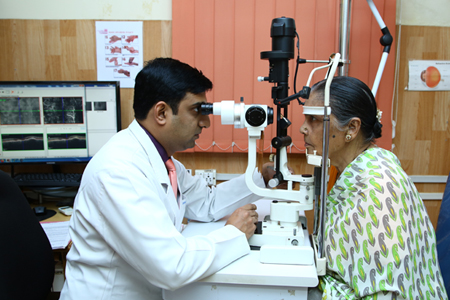- RETINA AND VITREOUS SERVICES
Retina and Vitreous Services: Preserving Your Vision Health
Discover specialized services focused on the health of your retina and vitreous. Our dedicated team uses advanced technology to diagnose and treat conditions affecting these vital parts of the eye.

Comprehensive Evaluations
Comprehensive evaluations of vitreous services include ultrasound imaging for structural assessment, vitreous humor analysis for composition study, and clinical examinations to diagnose and manage vitreous-related conditions effectively.
Common Conditions We Treat
Common conditions we treat include refractive errors (myopia, hyperopia, astigmatism), cataracts, glaucoma, age-related macular degeneration (AMD), diabetic retinopathy, dry eye syndrome, and eye infections. Our goal is to improve and preserve vision through comprehensive care and tailored treatments.
Treatment Options
reatment options for eye vision include corrective lenses (glasses, contact lenses) for refractive errors, cataract surgery, medications, laser therapy, and surgical procedures for glaucoma, anti-VEGF injections, photodynamic therapy for AMD, laser treatment, vitrectomy for diabetic retinopathy, and management strategies for other eye conditions to optimize visual health.
Patient-Centered Care
Patient-centered care of vision health focuses on personalized treatment plans tailored to individual needs. It includes clear communication, thorough education about conditions and treatments, involvement in decision-making, and ongoing support. Our approach aims to enhance vision health and quality of life for every patient.
- QUESTION AND ANSWER
Retina and Vitreous Services FAQ
The retina is a thin layer of tissue at the back of the eye that senses light and sends visual information to the brain. The vitreous is the clear gel that fills the space between the lens and the retina. Both are crucial for maintaining clear vision and detecting light.
Common conditions include retinal detachment, diabetic retinopathy, macular degeneration, vitreous hemorrhage, and macular holes. These conditions can lead to vision loss if not treated promptly.
Symptoms may include sudden flashes of light, floaters (small, dark shapes that float across your vision), blurred vision, distorted vision, or a shadow over your visual field. If you experience any of these symptoms, it’s important to seek immediate medical attention
Treatments vary depending on the condition and may include laser surgery, vitrectomy (removal of the vitreous gel), intravitreal injections, or retinal detachment repair. Early diagnosis and treatment are key to preserving vision.
Protecting your retina and vitreous involves managing systemic conditions like diabetes, avoiding smoking, wearing protective eyewear, and having regular eye exams. Early detection of issues through routine check-ups can prevent serious complications.

